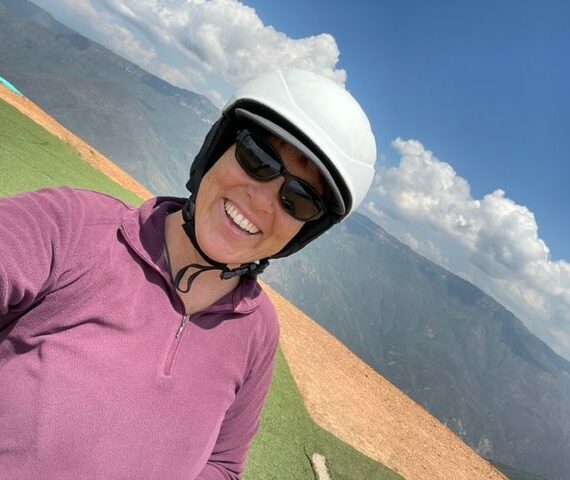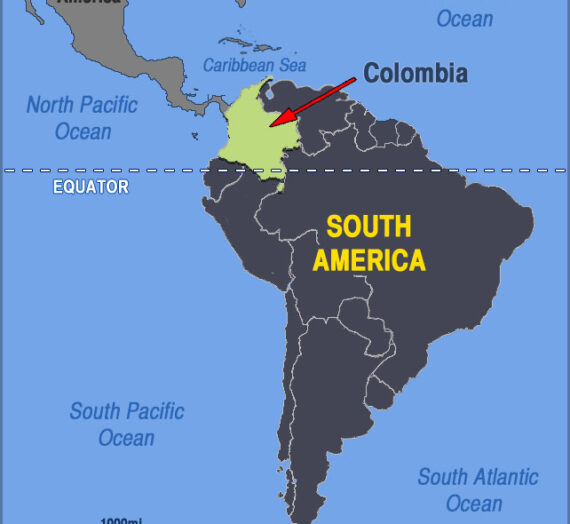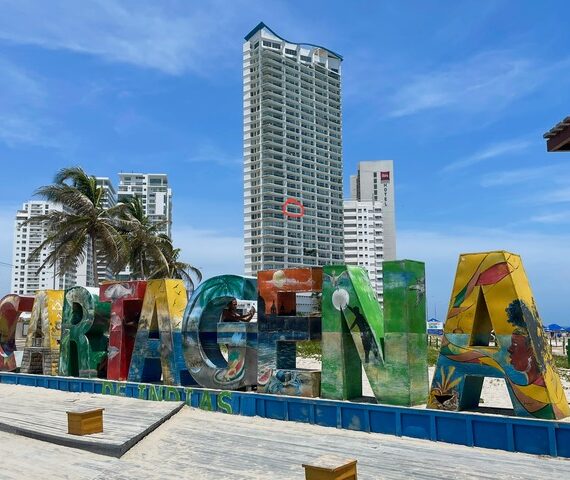
Like many of you around the world, the COVID pandemic disrupted my life completely and then gave me copious amounts of time to wonder what was next. I found myself putting a lot of thought into a longtime dream: a life of travel, volunteering, writing and living as a nomad in South America. Initially, a lot of doubt filled the corners of that idea. Then, I read a meme. It said that the biggest risk I can take is taking the chance that someday I will finally have the time, the energy, the knowledge, the money and the physical body for doing all the things that I’ve waited so long to do. Last February, if you remember, I decided I didn’t want to take that risk anymore.
After finishing my job in Cartagena, I decided to use the opportunity to try-out my equipment, my packing list and my gumption with three months of nomadic travel around Colombia. For me, planning for three months was an easier bite to swallow than planning for a year or more through multiple countries.
Once I announced that I was going to do this, my friends told me I was brave. I didn’t feel brave. I just felt curious. Many other friends and family questioned how I could manage all the planning and the expenses. Especially the expenses. As a seasoned traveler, none of it was very hard to figure out. I made adjustments as I needed and learned a lot in the process. My goal was to travel cheap, but travel deep, meeting locals and doing good along the way. And I did it!
I’m safely back in the United States now, and I’m really proud of how it all turned out. So, I’d like to share some of my travel hacks with you. Read on to learn more about how I managed myself and my money on my first solo nomadic adventure.
How I Travel on the Cheap
I often hear the excuse that travel can be expensive. I think that depends upon how you travel, where you stay and what activities you choose to do. Colombia is considered a less expensive country to travel in, but still, I toured and lived very comfortably for almost three months for a grand total of $1,500 US Dollars. If I continued in this manner, then I would spend around $6,000 a year on living expenses. Let me explain some of my travel methods and you can decide if any of them might work for you.


I Don’t Imbibe: An occasional beer on a very hot day with others, or a glass of wine with dinner on a special occasion is the extent of my habit.
I Eat Less: Depending upon my day, I will often eat breakfast late in the morning and a big lunch late in the afternoon. In Colombia, the Menu del Diá includes a soup, protein, two carbohydrates, a salad, juice and sometimes dessert for about $2.50. For dinner, a cup of tea or an apple tides me over. Alternately, I may eat a big breakfast, find a piece of fruit for lunch and then plan to have a larger dinner. Less meals = less money spent.


I Eat Local and Inexpensive Foods, and I Don’t Buy Water: I pay a lot of attention to my digestive system. This includes not only what I put into my mouth, but the color and consistency of what comes out my other end. You have to. Digestive issues can ruin a vacation! For me, I have to pay attention to my intake of fruits/ vegetables vs. carbohydrates and be very diligent in drinking enough water. If I don’t, my body wears down and I get sick. Vegetable soups and cooked meats are usually the safest bet. I also research extensively whether or not the water in a city is potable. If it’s suspect, I use a small water filter (sawyer.com) to clean the water from the tap before it enters my water bottle. I’m very careful. (Note: the only times that I have ever been sick is from a restaurant. If I get invited into someone’s home, I generally feel a lot safer. Locals know what they are doing and even if they don’t have potable water or proper sanitation facilities, they know how to cook something in a way to kill off any potential bacteria.)
I Don’t Buy Gifts: I take photos. I edit and organize them into albums on my computer so that I can revisit a quick summary of all my favorite moments anytime.
I Take Public Buses: If I can’t walk to a destination, I always try to take a bus. Apps like Google Maps, and Maps.me help me navigate, and locals are always happy to help me find a bus to get me where I need to go. Private taxis and plane tickets are expensive, so I save these splurges for when I know that I need to take precautions for my safety.


Does the idea of taking buses scare you? Let me try to convince you otherwise. Many travelers I meet avoid taking buses. Sometimes they don’t understand how much it costs or how to navigate the routes. Mostly, I think travelers are afraid to get lost. I say, get lost! Busses are the best! Riding a bus teaches you so much about the culture and the unspoken rules of the people. As a bonus, you get to see a lot more of the place you are visiting. For me, this is why I like to travel. It’s true, I speak enough Spanish to be able to ask some questions and navigate the routes. I’m also confident in my geographic knowledge that I generally know which way I need to go. But there’s one thing that makes local buses fail proof. If you really ever feel like you are completely lost, simply hop off in a busy looking neighborhood and find a taxi. With the address of your accommodations, you can safely get back to the start in no-time. It’s really that easy. And it’s fun. I’ve hopped on a bus many, many times with the sole purpose of getting lost, knowing that a taxi can always get me home.


South American countries also have an amazing system of long-distance buses. They’re very easy to navigate, they’re cheap, clean, and if they don’t have a bathroom on board, they stop every few hours for bathroom and food breaks. Many travelers take night-buses because it saves on an overnight accommodation. I personally don’t do this because I want to see the country I’m visiting and I don’t like the idea of being on a bus careening down a mountain road in the dark. So, I pack snacks, load up some practice-your-Spanish podcasts on my phone, and look forward to a good long cross-country bus ride to expand my understanding of the country.


Finally, regarding safety, I think buses are really safe. Especially when they are moderately full. Someone is always watching someone else. I keep a hold of my belongings, and stay alert, and if there’s a problem, the bus is full of good people that will come to my rescue. I often use this to my advantage. For example, when I’m not sure exactly where I need to get off for a destination, I might loudly ask another passenger for directions. You better believe that within three blocks before my stop, there will be about ten other passengers that make it a point to give me specific directions for how to arrive exactly at my destination. People love to feel like they’ve helped a foreigner- so I let them, and I use this to my advantage on busses all the time. (Note: Luckily, I’ve never been on a bus that got into an accident or been robbed. Many bus companies in South America are really trying to change their safety standards, but of course this could happen to me anytime. That said, I don’t think an incident would sour me from the great adventure of cross-country bus travel.)


I Cut Costs with My Accommodations: Accommodations are the biggest expense of traveling and there are many ways to cut expenses here, too. I used to think that you had to be a certain age to qualify to stay at a hostel. When I realized that wasn’t true, I thought that hostels were like communes and that I wouldn’t fit in. I have no idea where I was getting my information from, but I was well into my forties before I realized that hostels are an amazing resource for travelers of all ages and interests! Their purpose is primarily to provide comfortable accommodations, as well as cooking and living spaces for travelers. This often creates a sense of community for those of us far from home. When I first arrive into a region, finding a good hostel often helps me in more ways than one.
First, learning from other travelers’ experiences is invaluable as we talk about where we’ve been and where we’re heading. Many travelers depend upon these hostel communities to find new friends in hopes of exploring the region together. The owners of the hostels are always eager to help you navigate their town, or experience cultural activities. Sometimes, they’re willing to be your tour guide, too.


Beds in hostels are often organized into dormitory rooms or private rooms with shared bathrooms, but more and more I find hostels offering private bathrooms as well. Staying in dormitories are a great way for me to save money and continue conversations with others. I bring earplugs for sleeping, a small wire lock to store my valuables in a locker, and I try to be orderly and respectful. Almost all other travelers do the same. During the last year of COVID, I gave up worrying about staying in dormitories. If it is a larger room with some ventilation, it is good enough for me.


Another great way to save money is to cook your own meal. Hostels often allow you to use their cookware and kitchen facilities. I can always find a few eggs or vegetables at a street market and cook them up in the hostel kitchen for a very economical meal.
The final and very important benefit of hostels is that they have comfortable living rooms, work spaces with wi-fi, or sometimes gardens to enjoy. When I know I have a lot of writing to do, I look for a hostel, because it’s cheaper than having to work in a coffee shop. Therefore, hostels are really hotels… but with clean rooms, a kitchen, great common areas, and a warm and welcoming community.


How Do I Find These Hostels?
Booking.com or Hostelworld.com are a great source of information with true pictures, descriptions and helpful customer reviews. The reviews especially help me pick a hostel that doesn’t cater only to a young, party crowd. I use these websites frequently and if I’m going to arrive someplace after dark or during a busy season, I’ll make my reservation through them as well. But, to save money, if I know I’m going to arrive in town early enough in the day, I do my research to find available rooms, then I use my maps apps to get me there. When I show up at their door, the price is invariably less than I would have paid through the booking service. This routine also allows me to stay open to other possibilities, particularly if a cute mom-and-pop hotel catches my attention on the way. After all, I always try to support local business owners.
And the biggest secret to saving money…. Volunteer in a Work Exchange!
I like to volunteer in exchange for a free bed or meal. I love meeting and interacting with others and free accommodations are a huge benefit to my budget. Volunteering often gives me access to free clothes washing facilities too- Bonus!


As I was planning my three-month nomadic life, I spent a lot of time thinking about my pacing and my purpose. I knew I didn’t want to be a surface traveler, associating only with other first-world travelers and only doing the top 5 “must-see” activities before jumping to the next spot. On short vacations, I love to pack my days with fun. But I knew that if I was going to survive a long multi-month adventure, I needed to travel more slowly, more deeply. I like to get to know a community by hanging around, learning about them, and helping where I can. My hope is that by traveling in this manner, I make connections with people, improve our understanding of one another and build some friendships along the way. The best way I know how to do this is to volunteer! Workaway and Worldpackers are two great organizations for helping you find rewarding and free volunteer experiences.


During my stay in the Santander region of Colombia, I stayed on a private forest reserve helping a family with simple upkeep of their house and gardens as well as supporting the visiting scientists. Because this reserve was remote, my room, my transportation, my meals and use of the laundry machine were free. In the coffee region of Colombia, I chose to work at a hostel’s reception desk during the evenings so I could have my days free to explore the surrounding area. In this arrangement, only my bed in a dormitory was free to me, but I had use of the kitchen and the washing machine. In both locations I stayed over two weeks, learned about the community, made some friends and saved a lot of money. But more importantly for me, these volunteer opportunities gave me an opportunity to rest, unpack, and be a part of something for awhile. And that chance to integrate is really why I travel.
So, there you have it. Travel doesn’t have to be expensive. In Colombia, and everywhere else, you can travel slow, deep and on the cheap.
Happy Adventures!






Steven Murmann
You always seem to leave the places you visit better that you found them
Michelle Lane
Thanks for directing me to your website. Your writing is wonderful!!
Gayle Warberg
This is really valuable information on how to travel cheaply and get deeper experiences while traveling! Thank you for taking the time to share your expertise!